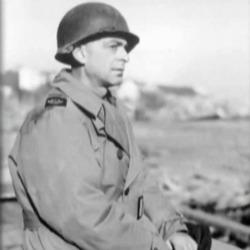This week’s delay of the AP’s story on the Yemeni bomb plot was nicely timed to coincide with the story of another AP embargo, this one from 67 years ago. Tom Curley, the president and CEO of The Associated Press, officially apologized on behalf of the AP for firing a reporter named Edward Kennedy, after he broke a government embargo and filed a story about Germany’s surrender in 1945.
[NEWSREEL CLIP/MUSIC UP AND UNDER]:
NARRATOR: “The red schoolhouse” at Reims, France, as peace is signed with German General Jodl acting for the remnants of the Nazi government. With the Americans, all the Allies sat in to enforce the terms we set long ago, surrender with no soft terms.
[END CLIP]
BOB GARFIELD: Kennedy and 16 other journalists had been invited to attend the German surrender in France, but were instructed not to report on it. For political reasons, the Allies wanted to delay reports of the surrender in France until a similar ceremony could be held in Berlin, where the Germans also would surrender to the Soviet Union.
Kennedy abided by the embargo initially, but after the Allies extended it another 36 hours he alone filed. The AP’s Tom Curley not only issued his company’s mea culpa, he co-authored the introduction to Kennedy’s new posthumously published memoir. Tom, welcome back to the show.
TOM CURLEY: Bob, it’s good to be with you.
BOB GARFIELD: First of all, is this a part of AP lore?
TOM CURLEY: When I got to AP in 2003, the last book on AP’s history had been completed in 1940. The reason the history had been not updated was because of this incident. I was told that it was very ugly and I didn’t want to go there, by some people. But we had to update the history. The people who covered Vietnam for us were beginning to pass away, so we either got to them and interviewed them about AP’s role in the coverage of Vietnam, or we would lose them forever. So the time had come, and we had to move forward.
BOB GARFIELD: Truth and reconciliation.
TOM CURLEY: Amen.
BOB GARFIELD: Let’s go back to 1945. Kennedy was witness to the surrender and held off for a while, like the other reporters did, but finally, as a matter of conscience, said, no, this story must be reported. What was at stake?
TOM CURLEY: People’s lives were at stake. If the news doesn’t go out, the soldiers keep killing each other. By delaying publication 18, 20 hours people were dying; the battles continued in a couple of places around Europe.
BOB GARFIELD: If his top management was prepared to fire him for breaking the embargo, how did his dispatch ever end up on the AP wire, in the first place?
TOM CURLEY: Kennedy made a decision on his own. Now, he was AP’s go-to guy. He was the front line bureau chief, so he got on the phone. He dictated 300 words, and the desk in London waited several minutes and decided to put it out. They were unaware, and there was no way for Kennedy to go to New York and talk to management there. If he had done that, he would have been subjected to the censors, and they would have known and they would have shut down the operation.
BOB GARFIELD: When you went back to the archives, did you discover any kind of useful rationale of management at the time for subjecting Edward Kennedy to – well, to the end of his days, the opprobrium of having been fired for misconduct?
TOM CURLEY: No, it was an absolute tragedy. What happened had become very clear. Kennedy filed the report, they affixed his byline because he had such credibility. In fact, there had been a false report by another organization a day or so earlier, and they wanted to add Kennedy’s byline because it carried such weight.
Management hailed him as a hero for about 36 hours, but there was an uproar among the newspapers and radio correspondents, and the board lead issued a statement and undercut Kennedy and AP management without talking to anybody.
BOB GARFIELD: This story emerges at almost exactly the same time that the AP uncovered a story that the AP was holding at the request of the government, I gather the irony is not lost on you.
TOM CURLEY: Well, of course, not. What happened this week showed one more time the conflict between journalism around security, and that the Kennedy story is as relevant today as any time in history.
BOB GARFIELD: Thank you so much.
TOM CURLEY: Thank you, Bob.
BOB GARFIELD: Tom Curley is the president and CEO of The Associated Press

